Los Yarderos: Mexican Yard Workers in Transborder Chicago (July, 2025)
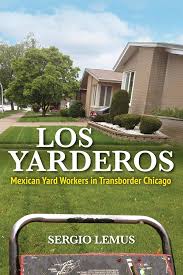
Migrants from the Mexican states of Zacatecas, Guanajuato, Jalisco, and Michoacán have become an important presence in Chicago and the Midwest. Many hold jobs as yarderos gardening, caring for lawns, and doing other landscaping work.
Sergio Lemus explores the lives of these migrants and looks at the struggles they face as they work to make the city their home. Drawing on fieldwork in South Chicago, Lemus tells the stories of first and second-generation yarderos and discusses the historical, economic, cultural, and political ramifications they face as they acquire their working-class identity. Lemus’s compassionate portrait places them within America’s ongoing tradition as a nation of immigrants while analyzing their place within today’s transborder cultural moment.
Perceptive and humane, Los Yarderos reveals how a group of Mexican immigrants navigates the crossings of the borders that divide class, color hierarchies, gender, and belonging. [from publisher web site]
Canaries in the Code Mine: Precarity and the Future of Tech Work (June, 2025)
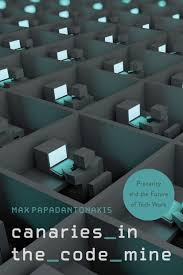
The idea that the tech industry is a secure field with jobs and opportunities for growth is a myth. There is widespread precarity among software developers, who experience uncertainty, anxiety, and imposter syndrome as technological advancements threaten job security. Max Papadantonakis investigates this phenomenon in his revealing study, Canaries in the Code Mine. He indicates that precarity is not just about the risk of losing one’s job; it is about living in a career where basic needs and rights are not guaranteed.
Interviewing 120 software developers from leading tech firms, Papadantonakis shows how temporary contracts, project cancellations, and company downsizing undermine the security of even highly skilled professionals. He also highlights the systemic inequalities that shape the tech industry, showing how age, race, and gender often dictate the opportunities and responsibilities software developers have—or are denied.
Canaries in the Code Mine highlights a disturbing reality of privilege and vulnerability within the tech industry. Papadantonakis engages in a critical discourse on the evolving nature of work in the digital era, emphasizing the need to shape an equitable future in the rapidly evolving landscape. [from publisher web site]
Fighting Toxic Ignorance: Origins of the Right to Know about Workplace Health Hazards (May, 2025)

Work, Pay, and Sustainability: A New Economics of Labor (April, 2025)
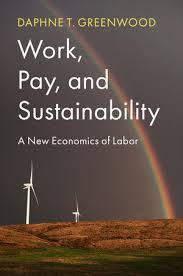
Daphne Greenwood presents the first comprehensive introduction to pluralist labor economics. She expands the economics toolbox with theories taken from institutionalist, feminist, social, ecological, and stratification economists. Pluralists, she explains, focus on how formal and informal institutions affect the distribution of productivity dividends—and how this has evolved over time. Pluralists are concerned with job quality as well as financial compensation. They acknowledge the modern-day abundance created by technology, but advocate for institutional changes to direct it in equitable and sustainable ways.
Building on the work of many heterodox economists, Greenwood introduces wage and employment models that are embedded in the economy, environment, and society. Beginning with evidence on work and pay in the US today, she explains why tools for analyzing commodity exchange are not sufficient for analyzing labor relationships. She brings bargaining power to the fore, analyses dynamic monopsony, and looks at the role of wealth as well as income in framing opportunities. Throughout the book, Greenwood addresses threats to sustainability and equity from unpaid social costs; institutional changes such as financialization and fissured workplaces; as well as race-ethnicity and gender. Among the possibilities explored for improving work and pay are sectoral bargaining, job guarantees, worker-owned cooperatives, and universal basic income. [from publisher web site]
The Oxford Handbook of the Law of Work (March, 2025)
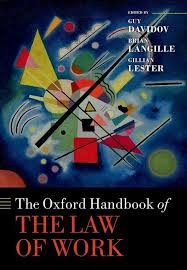
At the core of all societies and economies are human beings deploying their energies and talents in productive activities - that is, at work. The law governing human productive activity is a large part of what determines outcomes in terms of social justice, material wellbeing, and the sustainability of both. It is hardly surprising, therefore, that work is heavily regulated.
This Handbook examines the 'law of work', a term that includes legislation setting employment standards, collective labour law, workplace discrimination law, the law regulating the contract of employment, and international labour law. It covers the regulation of relations between employer and employee, as well as labour unions, but also discussions on the contested boundaries and efforts to expand the scope of some laws regulating work beyond the traditional boundaries.
Written by a team of experts in the field of labour law, the Handbook offers a comprehensive review and analysis, both theoretical and critical. It includes 60 chapters, divided into four parts. Part A establishes the fundamentals, including the historical development of the law of work, why it is needed, the conceptual building blocks, and the unsettled boundaries. Part B considers the core concerns of the law of work, including the contract of employment doctrines, main protections in employment legislation, the regulation of collective relations, discrimination, and human rights. Part C looks at the international and transnational dimension of the law of work. The final Part examines overarching themes, including discussion of recent developments such as gig work, online work, artificial intelligence at work, sustainable development, amongst others. [from publisher web site]
Ebook available to Cornell community: https://catalog.library.cornell.edu/catalog/16450392
Para Power: How Paraprofessional Labor Changed Education (February, 2025)
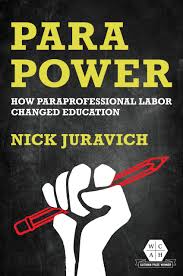
Paraprofessional educators entered US schools amidst the struggles of the late 1960s. Immersed in the crisis of care in public education, paras improved systems of education and social welfare despite low pay and second-rate status.
Understanding paras as key players in Black and Latino struggles for jobs and freedom, Nick Juravich details how the first generation of paras in New York City transformed work in public schools and the relationships between schools and the communities they served. Paraprofessional programs created hundreds of thousands of jobs in working-class Black and Latino neighborhoods. These programs became an important pipeline for the training of Black and Latino teachers in the1970s and early 1980s while paras’ organizing helped drive the expansion and integration of public sector unions.
An engaging portrait of an invisible profession, Para Power examines the lives and practices of the first generation of paraprofessional educators against the backdrop of struggles for justice, equality, and self-determination. [from publisher web site]
The Craft of Research (January, 2025)
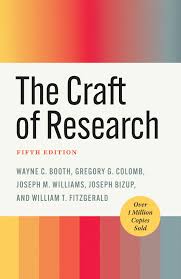
With more than a million copies sold since its first publication, The Craft of Research has helped generations of researchers at every level—from high-school students and first-year undergraduates to advanced graduate students to researchers in business and government. Conceived by seasoned researchers and educators Wayne C. Booth, Gregory G. Colomb, and Joseph M. Williams, this fundamental work explains how to choose significant topics, pose genuine and productive questions, find and evaluate sources, build sound and compelling arguments, and convey those arguments effectively to others.
While preserving the book’s proven approach to the research process, as well as its general structure and accessible voice, this new edition acknowledges the many ways research is conducted and communicated today. Thoroughly revised by Joseph Bizup and William T. FitzGerald, it recognizes that research may lead to a product other than a paper—or no product at all—and includes a new chapter about effective presentations. It features fresh examples from a variety of fields that will appeal to today’s students and other readers. It also accounts for new technologies used in research and offers basic guidelines for the appropriate use of generative AI. And it ends with an expanded chapter on ethics that addresses researchers’ broader obligations to their research communities and audiences as well as systemic questions about ethical research practices.
Laboring in the Shadow of Empire: Race, Gender, and Care Work in Portugal (December, 2024)
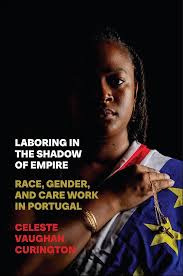
What Work Means: Beyond the Puritan Work Ethic (November, 2024)
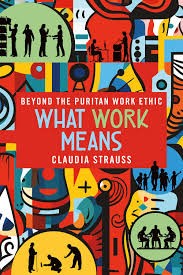
What Work Means goes beyond the stereotypes and captures the diverse ways Americans view work as a part of a good life. Dispelling the notion of Americans as obsessive workaholics, Claudia Strauss presents a more nuanced perspective. While some live to work, others prefer a diligent 9-to-5 work ethic that is conscientious but preserves time for other interests. Her participants often enjoyed their jobs without making work the focus of their life. These findings challenge laborist views of waged work as central to a good life as well as post-work theories that treat work solely as exploitative and soul-crushing.
Drawing upon the evocative stories of unemployed Americans from a wide range of occupations, from day laborers to corporate managers, both immigrant and native-born, Strauss explores how diverse Americans think about the place of work in a good life, gendered meanings of breadwinning, accepting financial support from family, friends, and the state, and what the ever-elusive American dream means to them. By considering how unemployment experiences diverge from joblessness earlier, What Work Means paves the way for a historically and culturally informed discussion of work meanings in a future of teleworking, greater automation, and increasing nonstandard employment. [from publisher web site]
China in Global Capitalism: Building International Solidarity Against Imperial Rivalry (October, 2024)
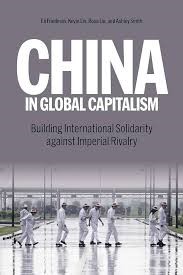
From trade wars and pandemic politics to rioting workers, intercontinental balloons, and battles over TikTok, the US media tends to present contemporary China—when it’s discussed at all—in sensationalist terms. This portrayal has only intensified as China’s relationship with the United States has grown increasingly hostile. Whether in the form of overtly racist rhetoric and aggressive trade actions, or the more buttoned down but equally antagonistic efforts to oppose Chinese interests abroad, the US has made clear that it has no interest in giving up its position as global hegemon. This seemingly endless cycle of nationalism, jingoism, and reactionary politics on both sides of the Pacific suggests a downward spiral that could plausibly result in catastrophic military confrontation.
China in Global Capitalism forcefully makes the case that workers and socially marginalized people in both the US and China must oppose our rulers’ claims that they have our best interests in mind as they ratchet up their rivalry. Rather, if we’re to avert nuclear calamity, we must oppose imperialism in all its forms, and regardless of its source and rhetoric.
Through snapshots of China’s growing social movements—from its labor struggles to feminist campaigns, and more—Lin, Liu, Friedman, and Smith provide some of the building blocks we’ll need to construct a movement that centers international solidarity across borders. [from publisher web site]